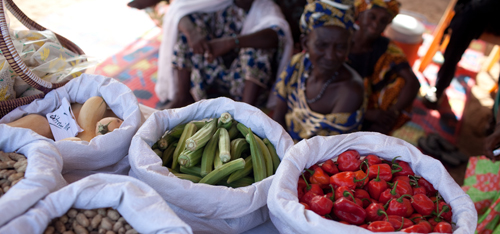Pesticide risk reduction
Since the early 1970s, farmers in West Africa have been encouraged to treat their crops with chemical pesticides. Today, chemical treatments are the most common pest management tool used in the region and many of the chemicals are highly toxic and either already banned in Northern hemisphere countries, or require protective equipment and conditions for use, outside the reach of African farmers. Based on the false sense that pesticides act as a kind of “insurance” against pests, farmers treat their crops routinely with pesticides, regardless of the existence of any serious pest threat. The weight of scientific evidence, in contrast, shows the vast majority of these pesticides do little or nothing to increase production and most often reduce farm profits and incur major negative side effects on human and environmental health.
FAO's Integrated Production and Pest Management (IPPM) programme has partnered with governments, non-governmental organizations, research institutions and farmer organizations at all levels to raise awareness on the importance of reducing or eliminating the use of toxic pesticides in agriculture.
Monitoring
Recent partnership with a US-based research institute — Oregon State University’s (OSU) Integrated Plant Protection Center — has resulted in development and adaptation of major new tools that promise to greatly assist in the monitoring of pesticides in the environment and to estimate potential negative effects on key biodiversity indicators, as well as on human health.
Furthermore, IPPM working in partnership with OSU (USA) and CERES Locustox Laboratory (Senegal) has carried out the first broad-scale, high-quality assessment of water in the Niger and Senegal River Basins and associated irrigation systems. The programme monitored pesticide concentrations in key surface water points over several weeks and to date has provided results based on farmer-practice surveys from 19 locations in six countries. These new tools, together with effective community-based education through farmer field schools (FFS), open up the possibility for widespread analysis of pesticides in West African agricultural systems and surface water systems.
Policy and legislation
The IPPM programme works closely with governments to create an enabling environment to reduce pesticide risks, to develop awareness-raising activities, policy and legislation, and to link with national and regional pesticide legislative bodies.
The tools and data generated by the programme will greatly assist governments to identify risks to aquatic and terrestrial ecosystems and to human health. It is hoped that the results will inform decision-makers at national and regional level, and help them to make sound policies, laws and regulations that comply with international treaty commitments.
The Permanent Inter-State Committee for Drought Control in the Sahel (CILSS) is currently planning to work with FAO and OSU in order to build capacity within their professional staff membership on the use of these cutting-edge monitoring and risk-assessment tools.
Education
Training on pest management via season-long FFS raises awareness of the health risks associated with pesticides and encourages farmers to reduce their use in favour of feasible, low-cost and non-toxic or less-toxic pesticides. It also touches on how to avoid commercial pressure to use pesticides. Immediate plans include working more closely with local pesticide sales persons to improve their knowledge on risk and efficacy, and thereby improve the quality of information feeding back to farming communities. Other improved crop-management practices introduced during the FFS have proven to help farmers boost production, improve profitability and enhance their economic and environmental resilience.

